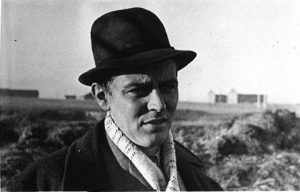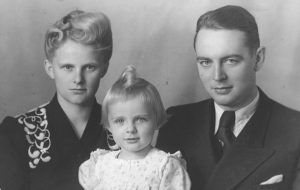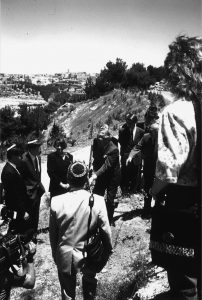– Text / Tekst in Deutsch / English / Polski –
[DE] Kann ein Unternehmer oder ein leitender Angestellter eines Unternehmens ein Retter sein, ein Gerechter unter den Völkern? Oder unternimmt er Rettungsversuche nicht aus Menschlichkeit, sondern nur aus dem Grund, Arbeitskräfte für das Unternehmen zu sichern? Der Verdacht wurde auch gegen Berthold Beitz geäußert, der als 28jähriger die kaufmännische Leitung eines Ölunternehmens im besetzten Galizien übernahm.
read more / Czytaj więcej >
Es gibt aber zahlreiche Zeugnisse von Überlebenden, dass er Juden, die keine Fachkräfte waren, Kranke, Alte und Kinder vor der Ermordung rettete. Er tat dies aus menschlichem Anstand unter Gefahr für sein eigenes Leben und das seiner Frau und Tochter. Er betrachtete sich selbst aber nicht als Held, sondern litt darunter, weil er vielen nicht helfen konnte. Sein Leben lang erinnerte er sich z.B. an diese Szene, als er Menschen aus einem Todestransport in das Vernichtungslager Belzec holen wollte. „Eine meiner Sekretärinnen…, die schrie meinen Namen immer aus dem Viehwaggon oben heraus, da habe ich sie herausgeholt. Und sie sagte: ‚Mit Verlaub: Ist es erlaubt, meine Mutter herauszuholen?‘, und ich dann: ‚Ja, hol sie heraus, komm.‘ Dann kam einer von der SS an: ‚Ja, was ist das denn?‘ ‚Ja, die arbeitet bei mir.‘ ‚Was, die alte Frau?‘ ‚Ja, das ist die Mutter.‘ ‚Nein, die geht wieder zurück‘, sagt er. ‚Die andere können Sie haben, die schenke ich Ihnen.‘ Und da sagte die Sekretärin: ‚ Ist es erlaubt, Herr Direktor, dann gehe ich auch zurück.‘ Und sie ist wieder in den Waggon hereingegangen zu ihrer Mutter.“ (Sandkühler, Endlösung in Galizien, S. 339f.)
Kurzbiographie Berthold Beitz
Rettergeschichte (Yad Vashem)
[EN] Can an entrepreneur or a manager of a company be a saviour, a Righteous among Nations? Or does he or she make rescue attempts not out of humanity, but only for the reason of securing manpower for the company? The suspicion was also raised against Berthold Beitz, who at the age of 28 took over the commercial management of an oil company in occupied Galicia. However, there are numerous testimonies from survivors that he saved Jews who were not skilled workers, the sick, the old and children from being murdered. He did so out of human decency, at the risk of his own life and that of his wife and daughter. However, he did not consider himself a hero, but suffered because he could not help so many. All his life he remembered, for example, this scene when he wanted to rescue people from a death transport to the Belzec extermination camp. „One of my secretaries …, who always shouted my name out of the cattle wagon upstairs, I took her out of it. And she said, ‚With respect, is it allowed to take my mother out?‘, and I said, ‚Yes, take her out, come.‘ Then one of the SS arrived: „Yes, what is it?“ „Yes, she works for me. „The old woman?“ „Yes, that’s her mother.“ „No, she’s going back,“ he says. „You can have the other one, it’s a gift. And the secretary said: “If it’s allowed, Mr. Director, I’ll go back too. And she went back into the carriage to her mother.“ (Sandkühler, Endlösung in Galizien, p. 339f.).
short biography Berthold Beitz
Rescuer story (Yad Vashem)
[PL] Czy przedsiębiorca lub kierownik firmy może być wybawicielem, sprawiedliwym wśród narodów? Czy może podejmuje próby ratowania nie z człowieczeństwa, ale tylko po to, by pozyskać pracowników dla firmy? O to podejrzewano również Bertholda Beitza, który w wieku 28 lat przejął kierownictwo handlowe koncernu naftowego w okupowanej Galicji. Istnieją jednak liczne świadectwa ocalałych, że uratował on przed zamordowaniem Żydów, którzy nie byli robotnikami wykwalifikowanymi, chorych, starych i dzieci. Zrobił to z ludzkiej przyzwoitości, z narażeniem życia własnego, żony i córki. Nie uważał się jednak za bohatera, ale cierpiał, ponieważ nie mógł pomóc wielu. Całe życie pamiętał na przykład scenę, kiedy chciał wydostać ludzi z transportu do obozu zagłady w Bełżcu. „Jedną z moich sekretarek…, która krzyczała moje imię z bydlęcego wagonu na górze, wyciągnąłem z niego. A ona na to: „Z całym szacunkiem, czy można też zabrać moją matkę?“, a ja na to: „Tak, zabierz ją, chodź.” Wtedy nadszedł jeden z SS: „A co to ma znaczyć?“ „No, ona pracuje dla mnie. „Co, ta stara kobieta?“ „Tak, to jej matka.“ „Nie, ona wraca“, mówi. „Tą drugą może Pan mieć, daruję ją Panu.” A wtedy sekretarka powiedziała: „Jeśli wolno, panie dyrektorze, ja też wrócę“. I wróciła do wagonu, do swojej matki.“ (Sandkühler, Endlösung in Galizien, s. 339f.).
krótka biografia Bertholda Beitza
Beitz_rescuerstory_Polish
Photos: Privatarchiv Beitz / Yad Vashem / Hasbron-Blume





Schreibe einen Kommentar